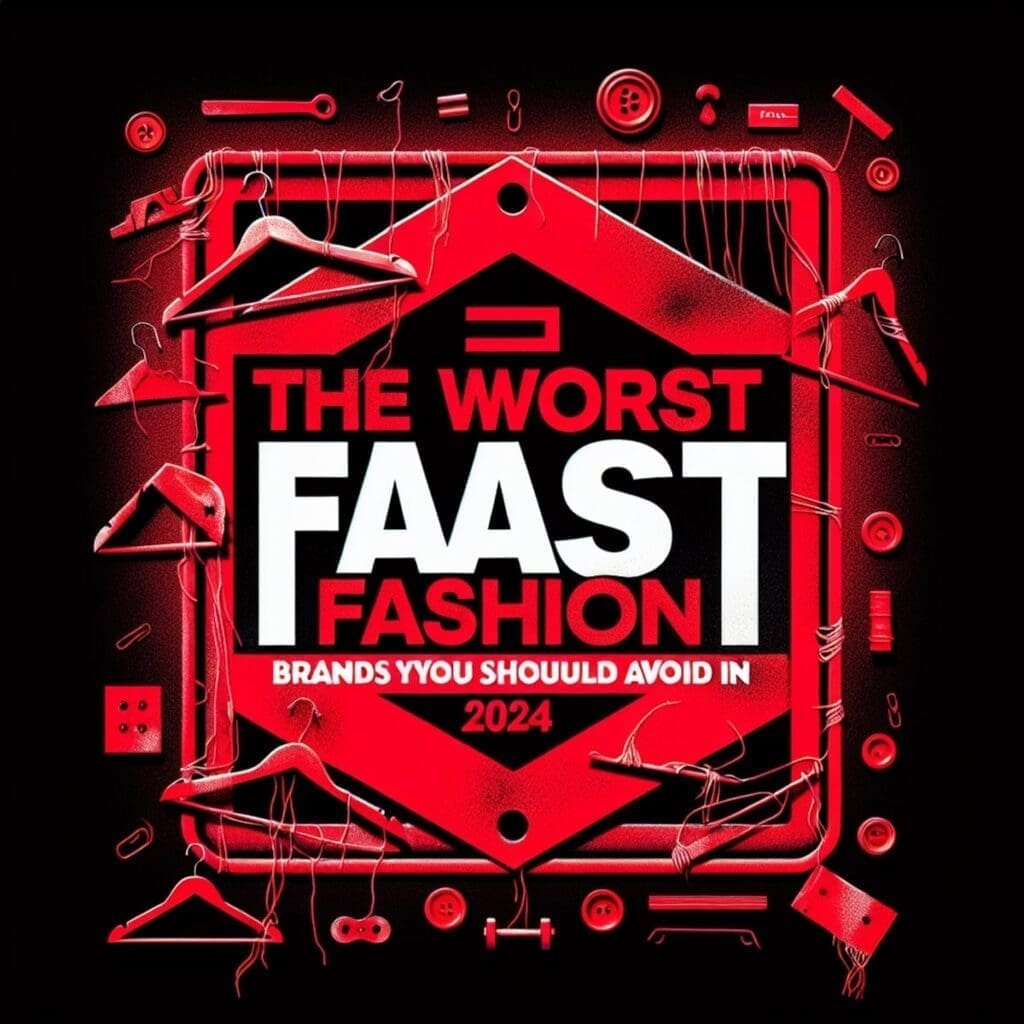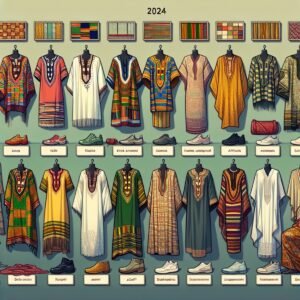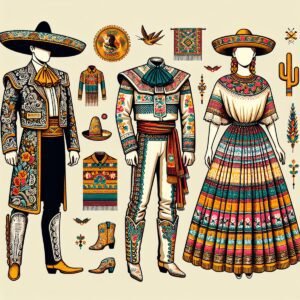
Introduction
Fast fashion has become a dominant force in the fashion industry, providing consumers with affordable and trendy clothing options. However, behind the facade of low prices and ever-changing styles lies a dark reality of exploitation and environmental degradation. In this article, we will explore the world of fast fashion and reveal the ten worst brands that you should avoid in 2024.
What is Fast Fashion?
Fast fashion refers to the rapid production and consumption of inexpensive clothing, often driven by short product lifecycles and constant demand for new styles. This model has significant consequences for both people and the planet.
Why It Matters
Addressing the issue of these worst fast fashion brands is crucial for several reasons:
- Holding Companies Accountable: It is essential to hold companies accountable for their actions and push for change within the fashion industry.
- Consumer Power: By avoiding these brands, consumers can play a role in demanding transparency, fair labor practices, and sustainable manufacturing processes.
What We’ll Cover
In this article, we will:
- Examine why each brand made it onto our list of the worst fast fashion brands.
- Dive into specific issues such as exploitative labor conditions, lack of supply chain transparency, environmental negligence, and more.
- Empower readers to make informed choices about which brands they support with their purchasing power.
Let’s get started by understanding why these ten brands have earned their place on our list.
1. Shein

Shein is undoubtedly one of the most notorious players in the fast fashion industry, known for its incredibly cheap prices and trendy styles that appeal to a wide audience. However, behind the facade of affordable fashion lies a series of unethical practices that make Shein one of the worst fast fashion brands you should avoid in 2024.
Labor Exploitation in Shein’s Supply Chain
One of the key highlights of Shein’s problematic business model is its exploitative labor conditions within its supply chain. Reports have exposed the brand’s reliance on factories with poor working conditions and low wages for garment workers. These workers often endure long hours, unsafe environments, and inadequate compensation, all in the name of fast fashion production.
Intellectual Property Theft Allegations
In addition to labor rights violations, Shein has also faced accusations of intellectual property theft. The brand utilizes AI technology to replicate designs from independent artists and other brands, leading to copyright infringement issues. This practice not only undermines the creative work of designers but also perpetuates a culture of copying instead of innovation within the fashion industry.
The use of AI software allows Shein to rapidly churn out new designs inspired by popular trends, but it comes at the cost of originality and ethical sourcing.
By replicating designs without proper permission or credit, Shein contributes to a culture of fast fashion that prioritizes profit over creativity and sustainability.
Supporting Ethical Brands
As consumers become more aware of the ethical implications behind their purchasing decisions, it is crucial to support brands that prioritize fair labor practices and respect intellectual property rights.
2. CIDER, VRG GRL, Edikted

These relatively new fast fashion brands have gained popularity in recent years, attracting consumers with their trendy styles and affordable prices. However, when it comes to sustainability and ethical practices, CIDER, VRG GRL, and Edikted fall short.
CIDER
Despite its trendy and Instagram-worthy clothing options, CIDER lacks a commitment to sustainability. The brand does not provide sufficient information about its supply chain or manufacturing processes, making it difficult for consumers to make informed choices. This lack of transparency raises concerns about the brand’s environmental impact and labor practices.
VRG GRL
VRG GRL is another brand that fails to prioritize sustainability. With its fast fashion business model, VRG GRL produces items quickly and at low prices. However, this approach often leads to overproduction and excessive waste generation. Additionally, the brand’s lack of transparency regarding its supply chain raises questions about worker conditions and fair wages.
Edikted
Edikted is known for its trendy clothing options targeted towards young consumers. However, like many other fast fashion brands, Edikted prioritizes speed and affordability over sustainability. The brand’s production methods may involve exploitative labor practices and contribute to environmental degradation.
While these brands may offer attractive clothing options at low prices, it is important to consider the ethical implications of supporting them. As consumers become more aware of the negative impacts of fast fashion on the environment and workers’ rights, brands like CIDER, VRG GRL, and Edikted must prioritize sustainability and transparency to gain trust from conscious consumers.
By choosing to support brands that prioritize ethical practices and sustainability, you can contribute to a more responsible fashion industry while still looking stylish.
3. Zara, H&M, Gap, Old Navy
Zara, H&M, Gap, and Old Navy are among the most established fast fashion brands known for their widespread presence and popularity in the global retail scene. These brands have gained massive consumer followings due to their affordable and trendy clothing offerings.
However, their fast-paced production model has raised significant concerns regarding environmental impact:
- The high demand for new styles at rapid intervals leads to excessive waste generation.
- It also results in a significant carbon footprint due to increased manufacturing and transportation activities.
Environmental Impact of Fast Fashion Brands
The fast fashion business model adopted by Zara, H&M, Gap, and Old Navy revolves around producing large quantities of inexpensive clothing in response to the latest fashion trends. While this approach allows them to offer affordable options to consumers, it comes at a great cost to the environment:
- Waste Generation: The constant pressure to release new collections leads to shorter product lifecycles. As a result, clothes are discarded more frequently, contributing to the growing issue of textile waste.
- Carbon Emissions: The entire supply chain of these brands involves energy-intensive processes such as fabric production, garment manufacturing, and long-distance transportation. This reliance on fossil fuels for production and logistics significantly adds to greenhouse gas emissions.
“The environmental consequences of such mass production cannot be overlooked.”
4. Supply Chain Transparency and Worker Rights Violations
Opaque supply chains have a significant impact as they enable labor abuses to happen without consequences. Primark, in particular, has faced criticism for its connection to factories that not only pay workers unfairly but also subject them to exploitation. Through investigative journalism, the public has become aware of the difficult conditions endured by these workers in Primark’s supply chain as highlighted in reports like Hidden Harm: Audit Deception in Apparel Supply Chains and the Urgent Case for Reform and Follow the Thread: The Need for Supply Chain Transparency in the Garment and Footwear Industry. This exposes the pressing requirement for better transparency and ethical standards in the fast fashion industry as discussed in this article on Primark’s sustainability practices.
Environmental Negligence of Worst Fast Fashion Brands
Fast fashion brands like American Eagle, ASOS, and Forever 21 have come under scrutiny for their environmental negligence and lack of sustainable practices. Here are some key talking points to consider:
1. Lack of Sustainable Manufacturing Processes
These brands have been criticized for their failure to implement sustainable manufacturing processes. Their production methods often involve the excessive use of resources, such as water and energy, leading to significant carbon emissions and environmental degradation.
2. Eco-Unfriendly Materials
Another area of concern is the materials used by these fast fashion brands. They frequently rely on synthetic fabrics like polyester, which is derived from non-renewable resources and has a high carbon footprint. Additionally, the production and disposal of these materials contribute to pollution and waste accumulation.
3. Controversies Surrounding Disposal
ASOS, in particular, has faced backlash for its disposal practices. In 2018, it was revealed that ASOS had sent unsold inventory to landfills rather than finding alternative solutions for recycling or donation. This wasteful approach not only harms the environment but also perpetuates the cycle of overproduction and excessive consumption.
To address these issues, it is crucial for fast fashion brands to prioritize sustainability and adopt eco-friendly practices. This can include:
- Implementing Sustainable Manufacturing Methods: Brands should invest in technologies and processes that minimize resource consumption, reduce waste generation, and lower carbon emissions throughout the supply chain.
- Using Eco-Friendly Materials: By opting for organic cotton, recycled fabrics, or innovative sustainable materials, brands can significantly reduce their environmental impact.
- Adopting Circular Economy Principles: Fast fashion brands should embrace circular economy principles by promoting garment recycling programs, offering repair services, and encouraging customers to extend the lifespan of their clothes through proper care.
By holding these worst fast fashion brands accountable for their environmental negligence, consumers can drive change within the industry and support brands that prioritize sustainability. It is essential to make conscious shopping choices and opt for brands that are committed to reducing their environmental footprint.
5. The Detrimental Cycle of Fast Fashion Consumption
Sustainability in the fashion industry is significantly impacted by consumer behavior. The fast fashion demand perpetuates a throwaway culture, leading to severe environmental consequences and exploitation of labor.
How Consumers Contribute to the Problem
Consumers play a pivotal role in sustaining the fast fashion industry through frequent purchases driven by the allure of low prices and trends. The constant desire for new clothing items contributes to the perpetuation of fast fashion’s detrimental cycle.
The Negative Effects of Short Product Lifecycles
The cycle is further fueled by short product lifecycles, as consumers rapidly discard clothing items in favor of new trends, resulting in excessive waste generation and resource depletion.
Environmental Consequences of Fast Fashion
The continuous influx of cheaply made garments places immense pressure on the environment due to high water consumption, chemical pollution, and textile waste that takes years to decompose.
The cycle of fast fashion consumption hinges on consumer habits, making it imperative for individuals to reassess their purchasing behaviors and embrace more sustainable approaches to fashion.
6. Impact on Garment Workers’ Communities and the Need for Fair Trade Practices
Fast fashion brands have long been criticized for their unethical practices and poor treatment of garment workers. The impact on the communities where these workers reside is significant, and it highlights the need for fair trade practices in the fashion industry.
Importance of supporting brands that prioritize fair wages and safe working conditions
One of the key ways to address the issues faced by garment workers is to support brands that prioritize fair wages and safe working conditions. Ethical fashion brands that adhere to fair trade practices are a step in the right direction. These brands ensure that their workers are paid a living wage, have safe working environments, and are treated with dignity and respect.
By choosing to support these brands, consumers can make a positive impact on the lives of garment workers and their communities. Fair trade certified labels provide assurance that the products have been produced ethically, ensuring that workers are not exploited or subjected to unsafe working conditions.
The need for fair trade practices
The need for fair trade practices in the fashion industry cannot be overstated. Garment workers often face long hours, low wages, and unsafe working conditions. They are frequently subjected to verbal and physical abuse, as well as harassment and discrimination. These harmful practices not only violate basic human rights but also perpetuate cycles of poverty and inequality.
Fair trade practices promote transparency in the supply chain, ensuring that workers receive fair compensation for their work. They also prioritize environmentally sustainable production methods, reducing the industry’s overall impact on the planet.
By supporting brands that prioritize fair trade practices, consumers can contribute to a more equitable and sustainable fashion industry. It sends a powerful message to fast fashion brands that exploitative practices will not be tolerated.
Supporting brands that prioritize fair wages and safe working conditions is crucial to improving the lives of garment workers and their communities. Fair trade practices in the fashion industry promote transparency and sustainability, making a positive impact on both people and the planet. By choosing ethically produced clothing, consumers can contribute to a more equitable and sustainable future for the fashion industry.
7. Empowering Change Through Your Shopping Choices
Conscious consumerism plays a pivotal role in reshaping the fashion industry. By making informed shopping choices, you can actively contribute to a more sustainable and ethical future of fashion. Here are some practical tips for empowering change through your shopping choices:
1. Build a Sustainable Wardrobe
Prioritize quality over quantity by investing in timeless pieces that are durable and versatile. Look for clothing made from eco-friendly materials and produced under fair labor conditions.
2. Embrace Pre-Loved Fashion
Explore thrift stores, consignment shops, and online platforms for second-hand clothing. Embracing pre-loved fashion not only reduces the demand for new fast fashion items but also gives a new life to existing garments.
3. Support Ethical Brands
Research and support brands that demonstrate a commitment to fair trade practices, transparency in their supply chain, and sustainable manufacturing processes. Look for certifications such as Fair Trade, B Corp, or organic labeling.
4. Practice Mindful Consumption
Before making a purchase, consider the longevity and versatility of the item. Opt for pieces that align with your personal style and can be integrated into multiple outfits, reducing the need for frequent new purchases.
By adopting these strategies, you can actively participate in shifting away from the detrimental cycle of fast fashion consumption while advocating for positive change within the industry. Your choices as a consumer have the power to drive meaningful transformation towards a more ethical and sustainable fashion landscape.
8. Collaborative Efforts for a Sustainable Fashion Future
The fashion industry is complex and vast, but change is possible when we come together and demand it. Collaborative efforts play a crucial role in driving systemic change within the fashion industry. By joining forces, consumers, brands, activists, and organizations can work towards creating a more sustainable and ethical future for fashion. Here are some key points to consider:
- Fashion Revolution Movement: The Fashion Revolution movement, which has gained significant momentum in recent years, aims to raise awareness about the social and environmental impacts of the fashion industry and promote transparency and accountability. Fashion Revolution Week, held annually in April, encourages individuals to ask brands #whomademyclothes and demand greater transparency in supply chains.
- Industry Collaboration: Brands, industry leaders, and organizations are increasingly recognizing the need for collaboration to address the challenges posed by fast fashion. Initiatives like the Sustainable Apparel Coalition (SAC) bring together brands, retailers, manufacturers, and NGOs to develop shared solutions for sustainability.
- Collective Consumer Action: As consumers, we have immense power to drive change through our shopping choices. By supporting sustainable fashion brands that prioritize ethical practices and environmental stewardship, such as those mentioned here, we can send a strong message to the industry. Additionally, engaging in collective actions such as boycotts or signing petitions can amplify our impact.
- Advocacy and Education: Empowering ourselves with knowledge about the fashion industry’s impact is crucial for advocating change. Educating others about the issues surrounding fast fashion and sharing information on sustainable alternatives can inspire more people to make conscious choices. Organizations like the ones listed here can provide valuable resources and support in this endeavor.
- Local Community Engagement: Supporting local artisans, designers, and independent businesses can foster a more sustainable and inclusive fashion ecosystem. By embracing locally made products or participating in clothing swaps and secondhand markets, we can reduce reliance on fast fashion while building stronger communities.
Remember that change takes time and effort, but every small action counts. By actively participating in collaborative efforts and making conscious choices, we can contribute to a more sustainable and ethical future of fashion.
“Alone we can do so little; together we can do so much.” – Helen Keller”.
Investing in Quality and Timeless Style
When it comes to building a sustainable and ethical wardrobe, one of the most important factors to consider is the quality of the clothing you purchase. By prioritizing quality over quantity, you can make a positive impact on the fashion industry and reduce your contribution to the fast fashion cycle. Here are some key points to keep in mind when investing in quality and timeless style:
- Choose sustainable fashion brands: Look for brands that prioritize sustainability in their production processes and materials. These brands often use organic or recycled fabrics, minimize waste, and support fair labor practices. Some notable sustainable fashion brands include Patagonia, Reformation, Everlane, and Eileen Fisher.
- Invest in investment pieces: Instead of buying trendy items that will quickly go out of style, focus on timeless pieces that can be worn for years to come. Classic styles like a well-tailored blazer, a little black dress, or a quality pair of jeans never go out of fashion and can be easily mixed and matched with other items in your wardrobe.
- Consider the cost-per-wear: When evaluating the price of an item, think about how often you will wear it. A more expensive piece that you can wear multiple times is often a better investment than a cheap item that will fall apart after a few wears.
- Take care of your clothes: Proper care and maintenance can significantly extend the lifespan of your garments. Follow care instructions, mend small damages promptly, and store your clothes properly to ensure they stay in good condition for as long as possible.
- Explore second-hand options: Thrift stores, consignment shops, and online platforms like Depop and Poshmark offer a wide range of pre-loved clothing at affordable prices. Buying second-hand not only reduces waste but also gives garments a second life.
Additionally, an interesting New York Times article highlights the rise of renting clothes as another sustainable fashion option. Renting allows you to enjoy high-quality designer pieces without the commitment of ownership, reducing both your environmental impact and closet clutter.
By investing in quality pieces that stand the test of time or exploring alternative options like renting, you can create a sustainable wardrobe that reflects your personal style while minimizing your impact on the environment. Remember, fashion should be about expressing yourself and feeling confident, and that doesn’t have to come at the expense of our planet or the people who make our clothes.
Conclusion
In this article, we have explored the 10 worst fast fashion brands that you should avoid in 2024. It is crucial to hold these brands accountable for their unethical practices and environmental impact. By shifting our support towards more sustainable and ethical clothing brands, we can contribute to a better future for the fashion industry.
Here are the key takeaways from our discussion:
- Shein: Shein stands as one of the most notorious players in the fast fashion industry, known for its cheap prices and trendy styles. However, it has been criticized for exploitative labor conditions in its supply chain and accusations of intellectual property theft through the use of AI technology.
- CIDER, VRG GRL, Edikted: These relatively new brands have emerged without a strong commitment to sustainability. Each brand has its own specific issues related to production methods and business practices that raise concerns about their ethical standards.
- Zara, H&M, Gap, Old Navy: While popular and widespread, these brands have faced criticism due to their fast-paced production models, resulting in excessive waste generation and carbon emissions.
Throughout our exploration, we have uncovered the detrimental impact of fast fashion on garment workers’ communities and the environment. Opaque supply chains enable labor abuses to go unnoticed, while brands neglect sustainable manufacturing processes and eco-friendly materials.
To break the cycle of fast fashion consumption, we must prioritize quality over quantity when making fashion purchases. Opting for timeless styles that can be worn for years encourages a more sustainable approach to our wardrobe choices.
By empowering ourselves through informed shopping choices and embracing pre-loved fashion, we can make a difference. Supporting fair trade practices and initiatives like Fashion Revolution Week also contribute to driving systemic change within the fashion industry.
In conclusion, it is vital that we continue to raise awareness about the worst fast fashion brands and actively support a shift towards a more sustainable and ethical future of fashion. Together, we can build a fashion industry that respects both people and the planet.
FAQs (Frequently Asked Questions)
What are some key highlights of Shein as one of the worst fast fashion brands?
Shein is known for exploitative labor conditions in its supply chain and the utilization of AI technology to replicate designs from independent artists and other brands, leading to accusations of intellectual property theft.
What are the specific issues related to newer fast fashion brands like CIDER, VRG GRL, and Edikted?
These relatively new brands lack commitment towards sustainability, and there are specific issues related to each brand’s production methods and business practices.
What are some key concerns related to established fast fashion brands like Zara, H&M, Gap, and Old Navy?
These brands have a fast-paced production model resulting in excessive waste generation and carbon emissions.
How do opaque supply chains impact worker rights violations in fast fashion brands like Primark, Victoria’s Secret, Urban Outfitters, Anthropologie, and Free People?
Opaque supply chains enable labor abuses to go unnoticed and unaddressed. For example, investigative reports have uncovered Primark’s involvement with factories that underpay and exploit workers.
What are some controversies surrounding the environmental impact of fast fashion brands like American Eagle, ASOS, and Forever 21?
These brands have been criticized for their lack of efforts towards implementing sustainable manufacturing processes and using eco-friendly materials. For instance, ASOS has faced controversies related to the disposal of unsold inventory in landfills.
How can consumers contribute to sustaining the detrimental cycle of fast fashion consumption?
Consumers sustain the fast fashion industry through frequent purchases and short product lifecycles, contributing to a throwaway culture that perpetuates environmental and social harm.
Why is it important to support fair trade practices in the fashion industry?
It is important to support fair trade practices in order to prioritize fair wages and safe working conditions for garment workers’ communities. This includes supporting brands that are Fair Trade certified.
What are some practical tips for avoiding reliance on fast fashion and embracing conscious consumerism?
Practical tips include building a sustainable wardrobe, embracing pre-loved fashion, and reducing reliance on fast fashion by making conscious shopping choices.
Why is collaborative effort important for driving systemic change within the fashion industry?
Collaborative efforts are crucial for driving systemic change within the fashion industry as they can lead to initiatives like the Fashion Revolution Week which aims to bring about positive changes in the industry.
Why is it encouraged to invest in quality and timeless style when making fashion purchases?
Investing in quality over quantity when making fashion purchases is encouraged because it prioritizes sustainability and supports sustainable fashion brands. Additionally, opting for timeless styles allows for long-term use of clothing items.






